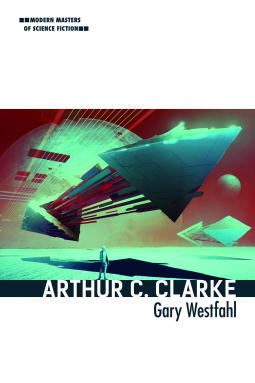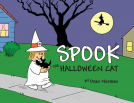
Arthur C. Clarke
by Gary Westfahl
This title was previously available on NetGalley and is now archived.
Send NetGalley books directly to your Kindle or Kindle app
1
To read on a Kindle or Kindle app, please add kindle@netgalley.com as an approved email address to receive files in your Amazon account. Click here for step-by-step instructions.
2
Also find your Kindle email address within your Amazon account, and enter it here.
Pub Date Jun 15 2018 | Archive Date Jun 28 2018
Talking about this book? Use #ArthurC.clarke #NetGalley. More hashtag tips!
Description
Already renowned for his science fiction and scientific nonfiction, Arthur C. Clarke became the world’s most famous science fiction writer after the success of 2001: A Space Odyssey. He then produced novels like Rendezvous with Rama and The Fountains of Paradise that many regard as his finest works.
Gary Westfahl closely examines Clarke's remarkable career, ranging from his forgotten juvenilia to the passages he completed for a final novel, The Last Theorem. As Westfahl explains, Clarke’s science fiction offered original perspectives on subjects like new inventions, space travel, humanity’s destiny, alien encounters, the undersea world, and religion. While not inclined to mysticism, Clarke necessarily employed mystical language to describe the fantastic achievements of advanced aliens and future humans. Westfahl also contradicts the common perception that Clarke’s characters were bland and underdeveloped, arguing that these reticent, solitary individuals, who avoid conventional relationships, represent his most significant prediction of the future, as they embody the increasingly common lifestyle of people in the twenty-first century.
Gary Westfahl, formerly of the University of La Verne and the University of California, Riverside, has now retired to focus exclusively on research and writing. His many books on science fiction include William Gibson and Hugo Gernsback and the Century of Science Fiction.
Advance Praise
"This is the most insightful analysis of Clarke I have seen. It has many gems, such as this irresistible pearl: 'Clarke's characters anticipate the way that more and more people now live their lives. Clarke's characters, then, may someday be regarded as his most significant prediction of the future, making him seem more like a twenty-first century writer than a twentieth-century writer—perhaps the greatest compliment one can imagine for a science fiction writer.' His scaffold leading to this is of the highest quality."--Gregory Benford
Available Editions
| EDITION | Paperback |
| ISBN | 9780252083594 |
| PRICE | $25.00 (USD) |
| PAGES | 224 |
Links
Average rating from 5 members
Featured Reviews
 Megan F, Librarian
Megan F, Librarian
When I first started Westfaul’s Arthur C. Clarke I thought it would read more like a biography. However, this book is instead a case study of Clarke’s work and Westfahl does an exemplary and thorough job of examining Clarke’s writings from his juvenilia to his final novel, The Last Theorem. Westfahl is able to give excellent insight into Clarke’s writing inspirations, connecting Clarke’s life experiences into his writing.
As a reader, you can venture through what is known of Clarke’s biography and see how it is linked to his writing, from his non-romantic characters to their anti-religious views. We see that his works are a reflection of his character and a predictor of the future, not emotionless and underdeveloped like some critics have come to believe. Westfahl also makes connections between the protagonists of Clarke, noting that most novels and novellas feature invention malfunctions and inventors that seek not scientific breakthrough and knowledge, but more selfish rewards. By analyzing Clarke’s work, we are able to glimpse into his life and understand the man more thoroughly, allowing us to grasp his works and ideas with more clarity and understanding.
Lastly, while those who are fans of Arthur C. Clarke may enjoy this book, be forewarned that because it is a case study, it goes into detail about many of his works. If you have not read many of his works and plan to, this will spoil many of the plots and outcomes. If you wish to go into his books without a preface of what is to come, then perhaps save this book for last. However, if you wish to go into his books with an understanding of the man himself (Clarke) and his inspirations for his novels, then this is the book for you.
 Mark Y, Reviewer
Mark Y, Reviewer
In recent times we’ve seen a number of classic SF authors no longer with us get the biographical treatment. A few years ago official biographies of Heinlein finally appeared (with more unofficial criticism on the way), and Ursula K LeGuin has a documentary currently being produced that summarises her life. With this appreciation of our classic authors, it is therefore fitting that in the year after the centenary of his birth, we read a book that attempts to analyse and criticise the author of 2001: A Space Odyssey.
This is a book that tackles an issue that I’ve felt has needed to be addressed for a while. As a life-long fan, I’ve believed that for one of the most famous science fiction writers of the 20th century (see also H.G. Wells, Bradbury, Heinlein and Asimov) there is remarkably little published about this author or his work.
Whilst Sir Arthur has had a biography published (Neil McAleer’s updated Sir Arthur C. Clarke: Odyssey of a Visionary, which I would also recommend) most of his own personal thoughts and diaries have been unknown, locked away in the ‘Clarkives’ with disclaimers that they are not to be made public until at least 2038.
With such a lack of information, it has made a definitive analysis of this already reclusive author difficult. Nevertheless, Gary, scholar, reviewer, editor of The Greenwood Encyclopedia of Science Fiction and Fantasy and, amongst other things, critic for Locus Magazine, has taken up the challenge of trying to piece together what few biographical sources about Sir Arthur there are out there. Perhaps more importantly, this book tries to analyse and criticise his writing, much of which has been undervalued and usually limited to a few sentences. As a long-time fan of Sir Arthur’s work, it makes fascinating reading.
The book begins with Arthur’s early life, and how he came to writing science fiction. Gary suggests that there are a number of key events at that time which led to themes running through Arthur’s fiction – for example, there is a continuous theme around the topic of ‘money’ and how much scientific exploration depends on that desire for it, or to get rich from it.
Sir Arthur’s work is full of inventors and explorers who profit from an invention or the discovery of something which makes them (usually a ‘him’) rich. Westfahl suggests that this theme may be due to Clarke’s own personal need to acquire wealth. Sir Arthur’s father died early in his life and this left Clarke Junior feeling that he always had to be financially secure, even when he was.
Also of interest is the ruminations Gary makes on Clarke’s ideas of aliens and space exploration. It is noticeable to Westfahl that much of Sir Arthur’s work is about aliens finding humans, not the other way around. From Childhood’s End to the monolith and the ‘Star Child’ in 2001 to the alien cylinder called ‘Rama’, the novels often examine the situation that it is the humans who are discovered, not the other way around. Despite what some critics have suggested, unlike many other authors of his time, Sir Arthur does not herald the human race’s expansion into space as a necessary or an automatic consequence of the human spirit.
Indeed, in his determination to write ‘realistic’ science fiction, it is noticeable that Clarke rarely goes beyond the Solar System. Eschewing the convenient yet scientifically unlikely development of faster-than-light travel, most of Sir Arthur’s work therefore remains based on Earth or within the realms of feasible human travel. It is only when the Earth is doomed that humans deliberately leave their home planet permanently (The Songs of Distant Earth, for example.)
Most interestingly, Westfahl proposes that Sir Arthur’s work, rather than being a positive view of future expansion, as many critics would have it, is, on closer inspection, actually rather bleak. Much of the future in Clarke’s worlds is based not on Mankind blazing a trail into the unknown (which is the usual view given by critics of his work) but also on the failure of the technology to get us there – from the stricken liner Selene sinking into moondust in A Fall of Moondust, to the destruction of the space elevator in Fountains of Paradise and even the breakdown of HAL in 2001, a message is subtly given that relying on technology in the future can be dangerous.
From this book it is clear that Clarke throughout his life was interested in a spiritual dimension as well as a practical scientific one. Though not particularly religious himself, he continuously examined and questioned spiritual issues in his writing – perhaps his most famous stories The Nine Billion Names of God or The Star (where the star over Bethlehem is discovered to have actually been an exploding supernova) are obvious examples of that.
Whatever Sir Arthur’s personal beliefs, it is clear that religion is an ever-present (some might say omnipresent) theme in Clarke’s work. The importance of religion to Mankind also examined through many of Sir Arthur’s novels as well as his short stories - the Buddhist monks of Taprobane in The Fountains of Paradise for example. Even his non-fiction book and television series The Mysterious Worlds of Arthur C. Clarke was made to show Clarke’s interest in the paranormal. Westfahl suggests that the alien ‘Overmind’ in Childhood’s End, the higher beings in his ‘underrated’ novel Imperial Earth and even the ending of 2001 are part of this connection that humans have to higher beings of consciousness that have been throughout Sir Arthur’s writing.
There are aspects of Sir Arthur’s life that have remained deliberately obscured, even in his official biography – his homosexuality (though an open secret to those who knew him) and his relationship with his scientific and literary peers are two that Gary tackles without sensationalism. Though not essential to an understanding of the author’s writing, these aspects serve to give us a better picture of the author, and perhaps what his personal motivations were. It does seem that ‘The Ego’ was driven not only by a need to popularise science, but a desire to show his peers that he could do so.
In summary, this critical guide does what it hopes to do – present a case why Arthur C Clarke’s work is important and why he has gained the reputation that he has. As a fan it is most welcome, but I think that those with a slight interest would find this interesting as well. Admittedly it is a book about books, which can sometimes be rather dry, but here, and most importantly, it is a thoughtful work that educates and entertains. It is written in such a way that it will be of interest to both fans and casual readers of Sir Arthur’s work. Not all of it is flattering, but nor is it a hagiography (which I felt the Patterson Heinlein duology was). By comparison, I felt that it is remarkably even-handed and effectively adds to the little that we know – or think we know – about Sir Arthur. Written by someone who ‘knows his stuff’, I feel that the legacy of Sir Arthur has finally been given justice, and therefore this guide is to be wholeheartedly recommended.
 Dom N, Reviewer
Dom N, Reviewer
Of the "Big Three" authors who dominated the Golden Age of science fiction, I've always felt I had the weakest grasp on Arthur C. Clarke. Isaac Asimov's oeuvre is easy to summarize: technological optimism and robots. Robert A. Heinlein tended to infuse his works with libertarian politics and nonconformists. As for Clarke? I've read several of his most famous novels and short stories, but always struggled to identify common themes. Clarke seems to veer wildly between hard-nosed science and wild-eyed mysticism. Childhood's End features humans who gain almost godlike psychic powers, while Rendevouz with Rama tells the story of a scientific exploration to a mysterious alien object. Hal 9000 in 2001: A Space Odyssey seems like a warning against A.I., yet Clarke was hardly anti-science - most of Clarke's protagonists are scientists.
Gary Westfahl's new study of Arthur C. Clarke helps situate his works into a comprehensive and consistent view of humanity's future. Westfahl points out several features of Clarke's writing that distinguish him from most other science fiction writers of the Golden Age. First, Clarke's admiration for scientific progress is tempered by his concerns over how humanity would use new technologies. He almost never depicts technology as an unadulterated good that would solve our problems. Second, while we often associate Clarke with space travel, he doubted mankind's ability to travel beyond the solar system. Instead of fantastic voyages to the stars and heroic milestones in exploration, Clarke spends more time imagining what everyday life in space might be like for our descendants. Finally, while Clarke believed humanity had the potential to evolve into something greater, he also that human civilization is vulnerable. Just one major cataclysm could wipe out the entire species.
Westfahl's book is not a conventional biography, but rather an intellectual exploration of Clarke's science fiction. The introductory chapter does provide a brief overview of Clarke's life, but Westfahl's mostly uses this to note that Clarke was a very private person. Few people claim to know him well.* Westfahl does occasionally note how the themes or characters in his stories reflect elements of Clarke's personal life. Perhaps the most interesting is Westfahl's observation that Clarke's characters tend to be taciturn professionals with little time for family - just like Clarke himself. While critics generally cite the "bland" and "underdeveloped" characters as a weakness of Clarke's writing, Westfahl argues that Clarke's approach to characters is in fact one of his more interesting predictions. Although Clarke didn't predict the Internet, his vision of people increasingly communicating over long distances and consumed by work seems to capture something important about the 21st century.
* (Fortunately, Clarke's private diaries are scheduled to be released 30 years after his death (in 2038), so we might eventually learn more about Clarke the person.)
The jury is still out on whether or not the humans of 2061 will resemble Clarke's cold professionals. On the one hand, Westfahl is correct to point out that marriage and birth rates have fallen. On the other hand, recent survey data paint a more complicated picture. Younger people still want to get married and have kids, but can't because of the financial costs. Moreover, while people in the 21st century do spend less time with friends and neighbors, they also spend more time with family, suggesting that interpersonal relations aren't quite dead. If we end up resembling Clarke's cold professional characters, it might be due more to economic constraints than to technology.
Overall, I recommend this book to students of science fiction, particularly fans of Arthur C. Clarke's work. Westfahl's knowledge of Clarke's oeuvre is encyclopedic. He manages to find patterns and themes in Clarke's diverse set of short stories, novels, and nonfiction works. While Clarke the human being remains a bit of a mystery, I have a better understanding of and appreciate for Clarke the science fiction intellectual.
[NOTE: I received a copy of this book from the publisher in exchange for an honest review.]
 Educator 317339
Educator 317339
Arthur C. Clarke was the writer who originally got me interested in science fiction, so I enjoyed reading more about the man behind the stories!
 Erica W, Reviewer
Erica W, Reviewer
As a lover of science and all things intellectual, I have always wanted to fall in love with science fiction. Sadly, it hasn't happened yet. For reasons unbeknownst to me, I have yet to find a Sci Fi series that has captivated me.
I came across a phenomenal text, serving as in-depth case study of the works by Arthur C. Clarke.
This was a marvelous way to step into a world I have always wanted to experience. Better still, I was able to learn more about this 'modern master of science fiction'.
This was a great book for me. Not written as a conventional biographical sketch, the text was an exploration, better described as an intellectual case study, of Arthur's works. As with most scholarly tests, Westfahl began with a well-written thesis. This was by far my favorite portion of the text. Of note, Westfahl, by far, met each objective he set forth.
Admittedly, I have never read any of Clarke's work; therefore, all of the material was new to me. I rather enjoyed the author's exploration of various plots, including spoilers. (NOTE: I love spoilers. I don't necessarily read to find out what happened. I read to enjoy the words.)
This phenomenal case study would be a wonderful read for those who wish to become Sci Fi authors or who love Sci Fi and wish to delve deeper into the psyche of one of the most esteemed Sci Fi authors. Moreover, this is an excellent text for college literature courses.










